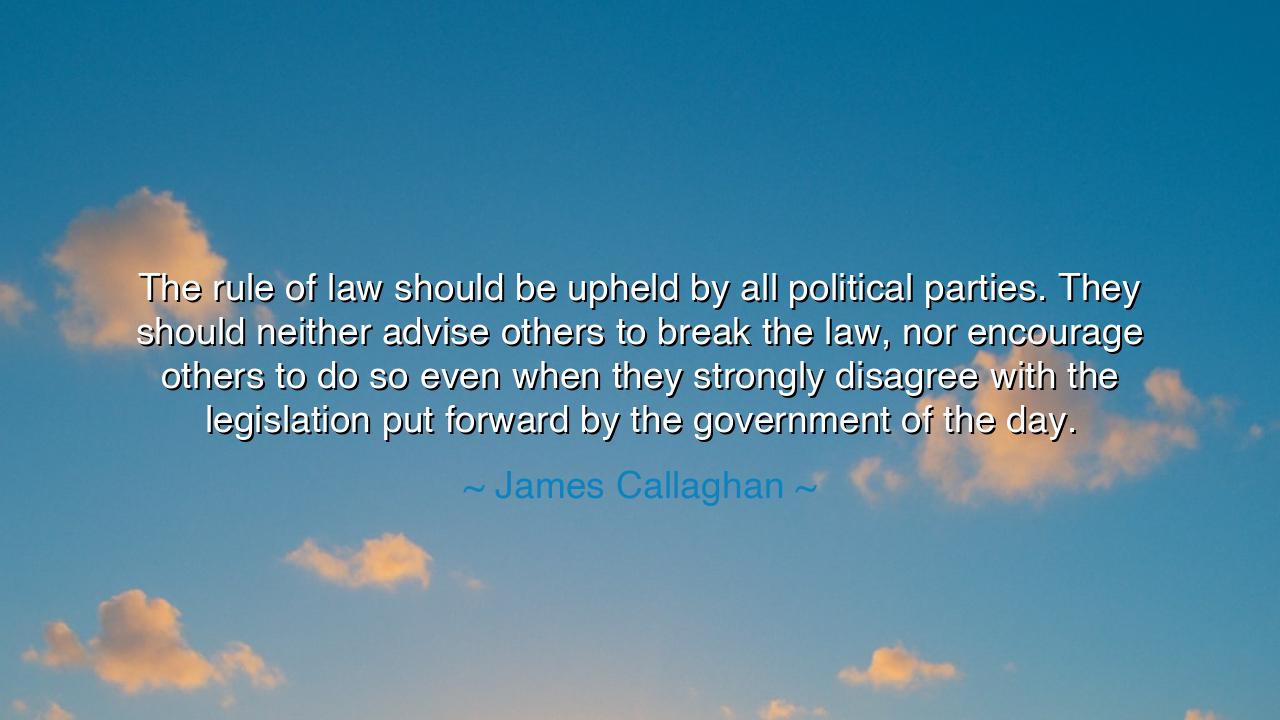
The rule of law should be upheld by all political parties. They
The rule of law should be upheld by all political parties. They should neither advise others to break the law, nor encourage others to do so even when they strongly disagree with the legislation put forward by the government of the day.






In the long twilight of the twentieth century, when the fires of ideology burned hot and nations trembled between reform and rebellion, the elder statesman James Callaghan — once Prime Minister of Britain — spoke words that gleamed like tempered steel:
"The rule of law should be upheld by all political parties. They should neither advise others to break the law, nor encourage others to do so even when they strongly disagree with the legislation put forward by the government of the day."
These words, though spoken in the halls of politics, rise beyond the realm of policy; they echo through the corridors of time as a moral decree. For the rule of law is not a mere instrument of governance — it is the spine of civilization itself, the golden thread that binds liberty to order, and passion to restraint. Callaghan, who had witnessed the tempests of political strife and the lure of populist fury, uttered this truth not as an idealist, but as a guardian of balance. He had seen how easily a democracy may crumble when those entrusted with power turn from law to expedience.
In his age, as in ours, the temptation was great. When laws seemed unjust or governments blind, men of fervor rose crying, “Break the law, for justice!” Yet Callaghan, wise as a seasoned captain steering through storm, reminded his people that the law must be the anchor of all, lest the ship of state be dashed upon the rocks of chaos. For if each faction obeys only the laws it favors, then law itself dies — and in its place rises the rule of strength, deceit, and vengeance.
Consider the ancient republic of Athens, once radiant with art and reason. When the assembly turned upon its own laws, when demagogues persuaded citizens that their cause was holier than order, blood flowed in the streets. Socrates himself, condemned by the will of the majority, chose not rebellion but obedience, drinking the hemlock rather than defying the law he had lived by. His death was not submission — it was testimony. For he knew that a people who scorn their laws, even for a righteous cause, prepare the way for tyranny. Without the rule of law, justice becomes the servant of rage.
Callaghan spoke in the shadow of Britain’s labor unrest — an era when strikes, protests, and passions threatened to rend the nation apart. He saw both the righteousness of the workers’ anger and the peril of their defiance. He did not preach blind obedience, but respect for the order that sustains dialogue. For law, he taught, is the language through which liberty and power speak without destroying each other. To forsake it, even in outrage, is to light the fire that consumes both ruler and rebel alike.
So too have other nations fallen to this truth ignored. In the dying years of Weimar Germany, factions on left and right scoffed at the rule of law — each claiming a higher justice. The communists dreamed of equality without order; the nationalists dreamed of purity without mercy. Both struck at the heart of lawful governance, and from their mutual disdain arose tyranny — the iron rule of one who made law serve his will alone. History’s sorrowful voice thus whispers: when leaders teach disobedience, even to unjust laws, they sow the seeds of despotism.
Yet the teaching of Callaghan is not submission — it is discipline. To uphold the law is not to worship it, but to protect the vessel through which reform may come. Laws may be flawed, but they are the bones of peace. Change them through debate, through conscience, through the sacred tools of democracy — but do not shatter them with fury, lest the darkness of anarchy claim the field. True courage lies not in breaking the law for belief, but in transforming the law through perseverance and principle.
In this, the wise find harmony: rebellion must serve justice, and justice must serve law. The tyrant breaks laws to rule; the fool breaks laws to boast; but the true reformer honors law even as he reshapes it. For obedience with wisdom is not weakness — it is strength governed by conscience, the mark of one who builds rather than destroys.
Therefore, O listener of generations to come, learn from the voice of this statesman: uphold the rule of law even when your heart burns with dissent. Let your protest be lawful, your speech be fearless, your conscience be steadfast — but let your hands be clean. Seek to change through the tools of reason, not the weapons of defiance. For a nation’s greatness is not measured by its fury, but by its fidelity to the principles that guard both justice and peace.
Thus ends the teaching: where law is honored, freedom endures; where law is scorned, freedom dies.






AAdministratorAdministrator
Welcome, honored guests. Please leave a comment, we will respond soon